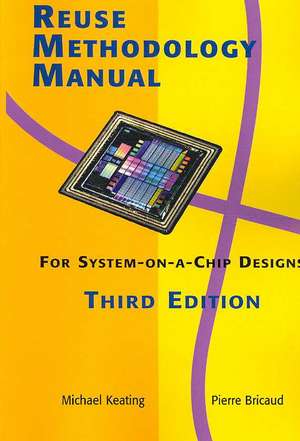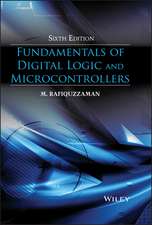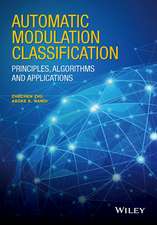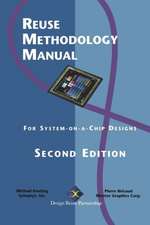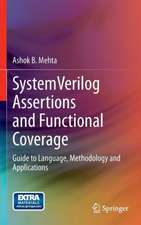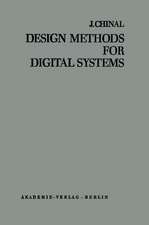Reuse Methodology Manual for System-on-a-Chip Designs
Autor Pierre Bricauden Limba Engleză Paperback – 11 sep 2007
Development methodology necessarily differs between system designers and processor designers, as well as between DSP developers and chipset developers. However, there is a common set of problems facing everyone who is designing complex chips.
In response to these problems, design teams have adopted a block-based design approach that emphasizes design reuse. Reusing macros (sometimes called “cores”) that have already been designed and verified helps to address all of the problems above. However, in adopting reuse-based design, design teams have run into a significant problem. Reusing blocks that have not been explicitly designed for reuse has often provided little or no benefit to the team. The effort to integrate a pre-existing block into new designs can become prohibitively high, if the block does not provide the right views, the right documentation, and the right functionality.
From this experience, design teams have realized that reuse-based design requires an explicit methodology for developing reusable macros that are easy to integrate into SoC designs. This manual focuses on describing these techniques.
Preț: 641.20 lei
Preț vechi: 754.36 lei
-15% Nou
Puncte Express: 962
Preț estimativ în valută:
122.72€ • 127.62$ • 102.69£
122.72€ • 127.62$ • 102.69£
Carte tipărită la comandă
Livrare economică 14-28 martie
Preluare comenzi: 021 569.72.76
Specificații
ISBN-13: 9780387740980
ISBN-10: 0387740988
Pagini: 291
Ilustrații: XX, 292 p.
Dimensiuni: 155 x 235 x 17 mm
Greutate: 0.44 kg
Ediția:3rd ed. 2002. 2nd printing 2007
Editura: Springer Us
Colecția Springer
Locul publicării:New York, NY, United States
ISBN-10: 0387740988
Pagini: 291
Ilustrații: XX, 292 p.
Dimensiuni: 155 x 235 x 17 mm
Greutate: 0.44 kg
Ediția:3rd ed. 2002. 2nd printing 2007
Editura: Springer Us
Colecția Springer
Locul publicării:New York, NY, United States
Public țintă
ResearchCuprins
The System-on-Chip Design Process.- System-Level Design Issues: Rules and Tools.- The Macro Design Process.- RTL Coding Guidelines.- Macro Synthesis Guidelines.- Macro Verification Guidelines.- Developing Hard Macros.- Macro Deployment: Packaging for Reuse.- System Integration with Reusable Macros.- System-Level Verification Issues.- Data and Project Management.- Implementing Reuse-Based SoC Designs.
Textul de pe ultima copertă
Features of the Third Edition:
Development methodology necessarily differs between system designers and processor designers, as well as between DSP developers and chipset developers. However, there is a common set of problems facing everyone who is designing complex chips.
In response to these problems, design teams have adopted a block-based design approach that emphasizes design reuse. Reusing macros (sometimes called "cores") that have already been designed and verified helps to address all of the problems above. However, in adopting reuse-based design, design teams have run into a significant problem. Reusing blocks that have not been explicitly designed for reuse has often provided little or no benefit to the team. The effort to integrate a pre-existing block into new designs can become prohibitively high, if the block does not provide the right views, the right documentation, and the right functionality.
From this experience, design teams have realized that reuse-based design requires an explicit methodology for developing reusable macros that are easy to integrate into SoC designs. This manual focuses on describing these techniques.
- UP TO DATE
- STATE OF THE ART
- REUSE AS A SOLUTION FOR CIRCUIT DESIGNERS
- A CHRONICLE OF "BEST PRACTICES"
- ALL CHAPTERS UPDATED AND REVISED
- GENERIC GUIDELINES-NON TOOL SPECIFIC
- EMPHASIS ON HARD IP AND PHYSICAL DESIGN
Development methodology necessarily differs between system designers and processor designers, as well as between DSP developers and chipset developers. However, there is a common set of problems facing everyone who is designing complex chips.
In response to these problems, design teams have adopted a block-based design approach that emphasizes design reuse. Reusing macros (sometimes called "cores") that have already been designed and verified helps to address all of the problems above. However, in adopting reuse-based design, design teams have run into a significant problem. Reusing blocks that have not been explicitly designed for reuse has often provided little or no benefit to the team. The effort to integrate a pre-existing block into new designs can become prohibitively high, if the block does not provide the right views, the right documentation, and the right functionality.
From this experience, design teams have realized that reuse-based design requires an explicit methodology for developing reusable macros that are easy to integrate into SoC designs. This manual focuses on describing these techniques.
Caracteristici
Reuse as a solution for circuit designers A chronicle of “best practices” All chapters updated and revised Generic guidelines - non tool specific Emphasis on hard IP and physical design Includes supplementary material: sn.pub/extras
